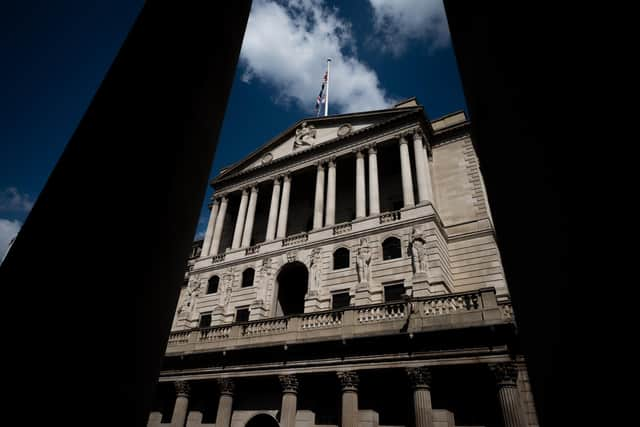Interest rates needed to rise but a more common sense approach is required - David Blunkett
Then, as now, it was all about whether ‘pain’ was inevitable when dealing with the economy, and in particular, inflation.
The infamous phrase which has re-emerged in recent weeks, “if it isn’t hurting it isn’t working”, of the then Conservative Chancellor, Norman Lamont, begged the question then, as it does now, as to who is being hurt, and why those feeling the pain are certainly not the ones to blame.
Advertisement
Hide AdAdvertisement
Hide AdThere is no doubt that high inflation is a bad thing. Bad, because it pushes up the cost of living for those who can least afford it. Historically it has always led to great instability, with political as well as economic dangers, and a spiral which results in people being worse off in the long term.


The question, therefore, is what are we trying to achieve, what tools are we using, and is economic orthodoxy the answer?
Monetarism, as it became known in the 1980s, is once again the prevailing orthodoxy of some economists.
I say some because it is clear that there is a divide between those who believe in TINA, and those who take a more nuanced and, in my view, common sense approach.
Advertisement
Hide AdAdvertisement
Hide AdDespite the fact there have been 13 interest rate rises over the last 18 months, the same people pushing for even greater interest rises are the ones who manage, simultaneously, to blame the Bank for not putting up rates fast enough and then blame the Bank for the consequences.
The Prime Minister, Rishi Sunak, extols us to “hold our nerve” without any clarity as to who the “we” might be.
The intent, however, is clear. Put simply: to take demand out of the economy, prevent what is presented as ‘overheating’, and persuade consumers to consume less and businesses to charge less.
But without growth, the Government receives less of our money, borrows more at higher interest rates and cuts back on essential services.
Advertisement
Hide AdAdvertisement
Hide AdThat is why the two members of the Bank of England’s Monetary Policy Committee who voted against an interest rate rise of 0.5 per cent in June deserve a medal.
Pushing against groupthink and refusing to be bamboozled into a particular mindset is the hallmark of intelligent thinking.
Interest rate rises may have what the government and the orthodoxy describe as “desired” outcomes, but which I would describe as deeply undesirable.
The most obvious is on those seeking to obtain or renegotiate their mortgage.
Advertisement
Hide AdAdvertisement
Hide AdBut as Buy to Let landlords fall out of the market, and those who would have taken out a mortgage unable to do so, the cost of renting has inevitably increased.
Add to this that interest rate rises do not have a substantial impact on the costs that worry people most – food and energy – and you get down to the economists arguing about ‘core inflation’.
This is said to be the outcome of those who can afford to do so spending money on things they don’t really need.
Who are these people? Well, those who have paid off their mortgage; those who are of an age where, should they be in rented accommodation, they will receive help with housing costs; the men and women who will receive a greater return on their fixed investments; and those who, for a variety of reasons, were able to save during the Covid lockdowns.
Advertisement
Hide AdAdvertisement
Hide AdWhat’s worse is that every time the Bank pushes up interest rates, many in the financial markets and self-serving pundits start to factor in (yes, you’ve guessed it), the next interest rate rise. The momentum starts all over again.
The last increase is pocketed, and because of the long lead-in times for interest rates to have any impact, the cry goes up that interest rates ‘will surely rise again in August’.
There are things the Government could do. They could put up certain taxes which might affect those who are not impacted by the interest rate rises.
They could take urgent action to bring some of the 2.5 million of working age who are currently economically inactive back into the labour market. It is, according to some economists, the tightness of the labour market which is the problem.
Advertisement
Hide AdAdvertisement
Hide AdHaving reduced immigration from the EU, we are now enjoined to encourage people to lose their jobs in order to limit the pressure on salaries to keep up with increasing inflation.
There are half a million fewer people working than before the pandemic, and yet no one has put in place the mechanism that would encourage those who could work from home, but perhaps not travel to work, to do so. After all, millions of those who could travel to work, now prefer to work from home.
Of course, interest rates had to rise, but giving time for previous rate increases to take effect, equipping people with the skills we need, getting people off disability and sickness benefits and back into work would surely be a much better way of ‘holding our nerve’ than punishing the beleaguered population of the UK for a combination of government mismanagement, the 49 days of the Liz Truss experiment, and global influences genuinely beyond any individual government to control.
For God’s sake, let us get back to some sort of common sense, lay aside the group think, and start thinking for ourselves.
David Blunkett is a Labour Party politician, and served as the MP for Sheffield Brightside and Hillsborough.